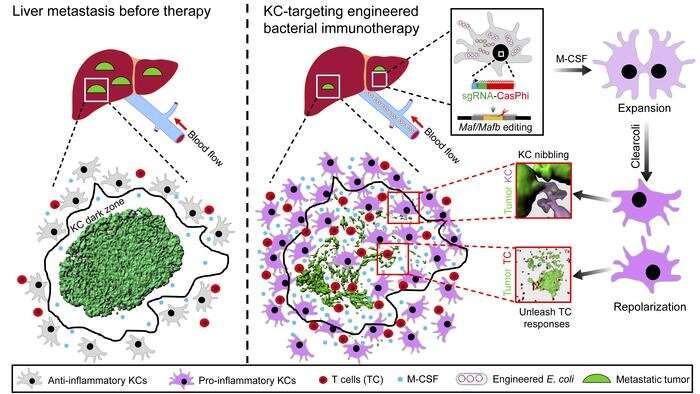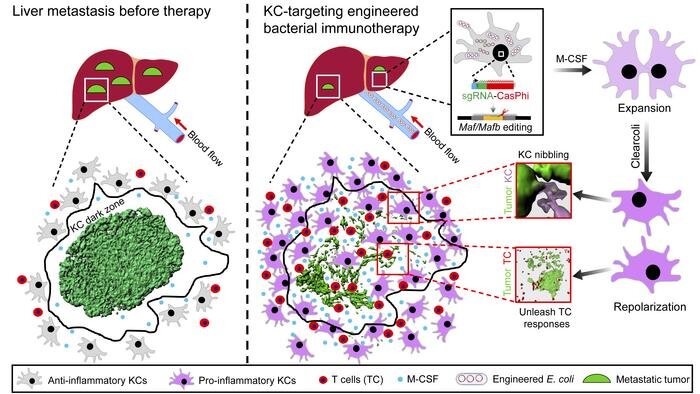
The research group led by Prof. Zeng Zhutian from the Division of Life Sciences and Medicine of the University of Science and Technology of China (USTC) revealed a new mechanism of immune surveillance by liver-resident macrophages called Kupffer cells (KCs) that prevent liver metastasis from occurring. They also developed a new method for in situ targeted expression and remodeling of KCs’ anti-tumor function, which successfully cleared tumors in various animal models with end-stage liver metastasis, thus providing a new approach to developing clinical immunotherapy for metastatic liver cancers.
The study was published in the Journal of Clinical Investigation titled “In situ expansion and reprogramming of Kupffer cells elicits potent tumoricidal immunity against liver metastasis.”
More than 90% of cancer patients die of tumor metastasis, with liver metastasis being common and having a poor prognosis. Currently, clinical treatment options for liver metastasis are limited and due to the liver’s immune tolerance, T cell-based immunotherapy strategies also receive a poor response, necessitating the development of more effective immunotherapeutic approaches.
The liver contains the largest quantity of tissue macrophages called KCs, which play a central role in natural immune surveillance in the liver due to their powerful phagocytic function and extremely rapid immune response. Researchers demonstrated that KCs play an essential role in early-stage tumor suppression in liver metastasis. However, their function was found to be impaired in the later stages of liver metastasis. Furthermore, combining clinical samples with animal models, they discovered that liver metastasis gradually induces selective loss of KCs around tumors, preventing them from entering the tumor and exerting anti-tumor effects.
Based on this discovery, researchers developed a low-toxicity engineered E. coli carrying CRISPR-CasΦ elements that specifically target and perform in situ gene editing of KCs. Targeted inactivation of two key transcription factors regulating macrophage proliferation and function in KCs (i.e., c-Maf and MafB) can induce rapid expansion of tumor-associated KCs and promote pro-inflammatory functional changes, significantly enhancing KC infiltration in the tumor and their ability to phagocytose tumor cells, thus reshaping the tumor’s immune microenvironment and inducing long-lasting effective anti-tumor T cell responses.
This strategy successfully cleared tumors in various end-stage mouse models of liver metastasis from melanoma, colon cancer, and lung cancer. The results suggest an immunotherapy approach that could be useful for addressing liver metastasis and underscore the potential of directing treatment towards macrophages residing in the tissue as a form of therapy for cancer.
More information:
Wei Liu et al, In situ expansion and reprogramming of Kupffer cells elicits potent tumoricidal immunity against liver metastasis, Journal of Clinical Investigation (2023). DOI: 10.1172/JCI157937
Journal information:
Journal of Clinical Investigation
Source: Read Full Article
